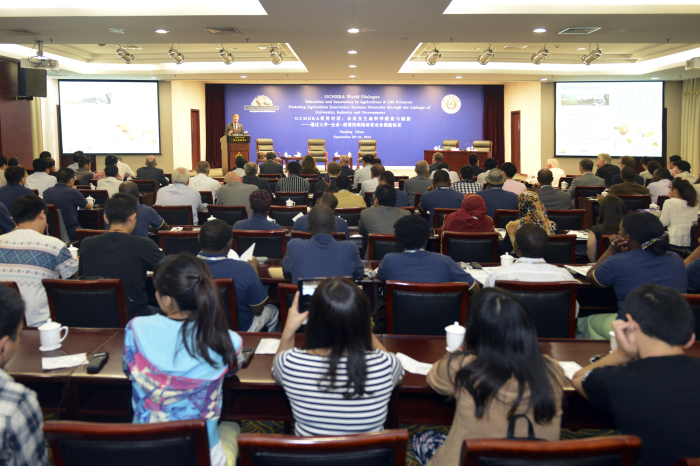YPARD made its voice heard in GCHERA 2014
 YPARD China Deputy Representative, Jiaqi Huang went to the Nanjing Agricultural University to attend and give a speech at the Global Confederation of Higher Education Association (GCHERA) World Dialogue: Fostering Agriculture Innovation Systems Network through the Linkage of University, Industry, and Government on September the 20th, 2014.
YPARD China Deputy Representative, Jiaqi Huang went to the Nanjing Agricultural University to attend and give a speech at the Global Confederation of Higher Education Association (GCHERA) World Dialogue: Fostering Agriculture Innovation Systems Network through the Linkage of University, Industry, and Government on September the 20th, 2014.
The aim of this event was to provide a forum for universities and other stakeholders to come together and share best practices in research and innovation with the goal of a coordinated global approach to helping solve some major issues facing society, such as environmental sustainability and nutritional security.
In order to address the problem of youth engagement in agriculture, Jiaqi Huang was officially invited and gave the inspiring speech “Meeting the needs of youth to meet the needs of future agricultural” to showcase YPARD’s role in fostering young professionals devoting in agriculture. The speech analysed the interaction between the needs of a new agriculture and the youth.
Trans-disciplinarity
Agriculture and farming face many challenges such as climate change, limited natural resources, loss of agricultural biodiversity, etc. With these constrains, as we’ll have to feed nearly 9 million people in 2050, there is a complex management required to deal with a series of problems along the food value chain, from environmental pollution, social welfare, to food safety, food loss and waste, etc.
The globalization’s impacts on agriculture are no longer just highly competitive global markets for agricultural commodities; these also mean multinational S&T cooperation, investment in agriculture abroad, as well as food and agriculture aid in under-developed countries. Hence, the future agriculture will tend to be multifunctional, industrialized, integrated and intelligent.
This changing in agriculture actually brings a lot of opportunities for young people, who have very good qualities; they’re passionate, creative and cooperative. But these are not enough for them to catch those opportunities. We need trans-disciplinarity. We will need to use biotechnology, information and communications technologies, space sciences and materials sciences, mix them appropriately and use them in innovative ways to resolve the new challenges. Which means young professionals will need to train on their own in the new trans-disciplines for every opportunity and won’t have mentors, guides and teachers.
Curricula development
Young scientists and technologists of today will need to build new capacities through complex systems theory. For example, solving the complexity of supply chains for fresh agricultural products to specific consumers in urban areas.
The globalization of agriculture requires not only understanding foreign farming systems but also legislation and standards such as for biosafety, food safety, traceability, good agricultural practices, foreign languages, culture, societal norms, local human behaviour, etc. It is possible that very soon, higher agricultural institutions will need to include subjects that enable their graduates to be “internationalists” in farming and agriculture.
These opportunities will be more attractive for the innovative youth, but at the same time, we need to educate and nurture youth towards an innovative way to meet these opportunities. Therefore, curricula development is required to respond to a changing agriculture as the skills of graduates do not meet the needs of agricultural sector and new multi-disciplinary approaches are not well developed and extended.
Corresponding to the theme of GCHERA, Jiaqi set some expectations of youth’s role and shared some YPARD China’s experience to encourage youth to devote their passion and effort into agriculture. In the end, YPARD China Deputy Representative mentioned that YPARD is looking forward to working with GCHERA to enhance agricultural education so that strong youth leaders can take the sector forward!
Picture Source: Nanjing Agricultural University News.
Related Posts
Comments
By accepting you will be accessing a service provided by a third-party external to https://archive.ypard.net/

